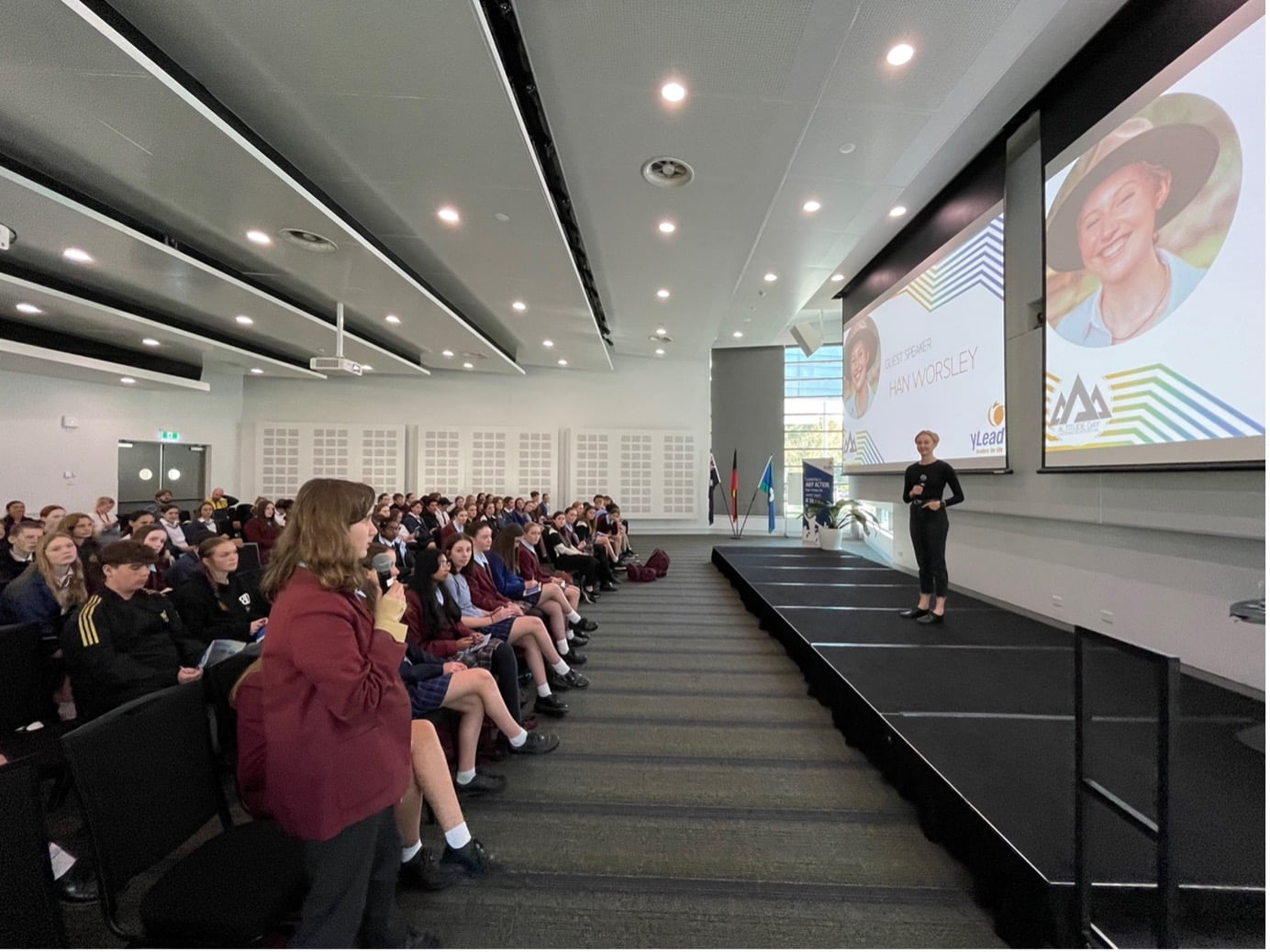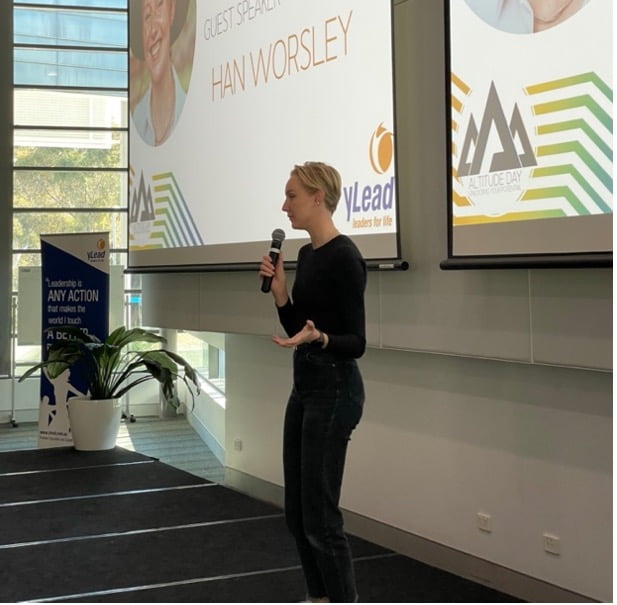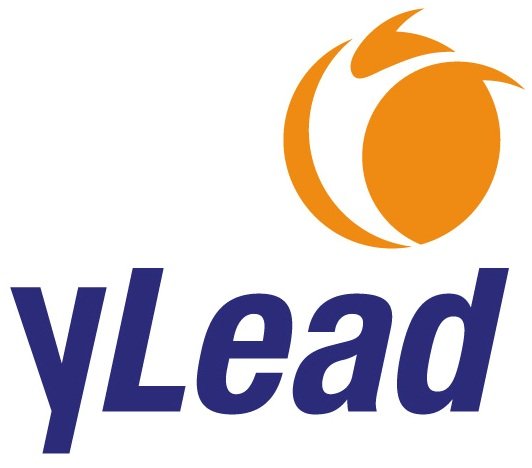
At yLead we believe that simple positive actions, have great impact. Across the Altitude Day roadshow our world-class guest speakers shared their stories, messages, and actions they take to make the world around them a better place. Their captivating messages equally inspired and influenced Year 9 students Australia-wide to also commit to positive actions in their worlds.
Altitude Day Canberra heard from one talented and aspirational person, Han Worsely, an incredibly passionate individual making an impact on their community. Han leads with 100% in everything they do, working towards making this world more inclusive and accessible.
These are the actions Han committed to in order to make their world a better place:

So Han, tell us! The world would be a better place if…
There were more dogs or more cats?
Definitely more dogs. I have two kelpies on the farm and also have a little pug called Charlie who is our wonderful little geriatric pet who cruises around.
You got to spend holidays in the snow or holidays at the beach?
I’m really lucky that I live at the snow and I’ll still say holidays at the snow.
You could read a book at home or summit a mountain?
Read a book at home. I have just finished a book called a Little Life by Hanya Yanagihara and I’m reading her new book To Paradise now, which I’m really enjoying as well. I’d recommend her as an author!
You sleep in or wake up at sunrise?
Wake up at sunrise. It’s very optimistic but I just feel good for the rest of my day when I do that. I listened to a podcast this morning on the way to work, and it spoke about the things that are generally better for you are the things that feel worse before you do them.
You could fly or go invisible?
That’s a tricky one! I would fly. This may be the country kid in me, but I think it would make my life a lot easier. When I need to go and catch my horse or something, I could just fly there instead of having to run up a hill.
Tell us how you are currently making the world a better place…. [talk about your initiative/work]
To find out what I love essentially came from my education and rural background. My upbringing was on a mixed grazing property in Northern New South Wales. I further discovered my real passion through volunteering, as well as being in the education industry with a teaching degree.
The work that I do really marries the two passions of those two particular areas. I have been volunteering with an organisation called Country to Canberra since I was 15 years old. Country to Canberra aims to support young, rural women and non-binary people to become leaders in their communities. I was lucky enough to be the CEO of that for a couple of years and have now stepped back from that role to focus on a new job that I have, which is working for the Country University Centre, a charity supporting people who are studying online from rural and remote areas across Australia. So, you can see the real crossover between those two big projects. Then I also do lots of speaking, travelling, and other volunteering, basically trying to do anything to support young rural people, in particular young rural women and LGBT people.
If you could talk to your 14-year-old self… what are some actions you would inspire yourself to take?
I was a really academic kid and that was part of why I felt I had to leave my little town because it’s really not pitched as the place you stick around if you’re smart in a very traditional sense. I use that word very loosely because there are plenty of things I am absolutely hopeless at, but if you want me to study something and memorize it, that’s always been something I was good at. As a kid it was really pushed upon me that I should try, as I said, get out of the town. I went on every ‘nerd camp’ known to man; I went to science forum, I went to band camp, I even tried dance camp, which might not be particularly nerdy, but I wasn’t very good at it. I went on all these different experiences in order to try and seek things outside.
Although all of them have given me something, I’d tell my 14-year-old self to look a little bit closer to home, to see the value in the community around you and to take stock of where you come from and use that as an asset rather than constantly seeing it as a liability. It would’ve taken pressure off my shoulders personally, but I also think it would’ve meant that I gave a bit more to my local surroundings rather than always looking outwards and looking for other places with that energy.
As someone that does great work and has discovered their own unique way to make the world a better place, what do you believe holds people back from doing the same?
I don’t want to get too political but there are some systems that can be really hard to overcome which sets external barriers. One of the things you can learn to do is to really advocate for yourself and say, “Hey, have you thought about changing that? That can really limit people from making those big changes or taking big steps in their leadership journey as well. It’s a confidence thing that comes down to so much more than just who you are, it’s also about the environment around you as well. As someone who is non-binary, I was so excited to see that they have the option to put my pronouns down and to even choose a gender neutral title at my new gym. Those sorts of things are systemic that can really have an impact on my confidence and how I will feel in different environments.

”One of the things you can learn to do is to really advocate for yourself and say, “Hey, have you thought about changing that? That can really limit people from making those big changes or taking big steps in their leadership journey as well.
As a leader trying to have a positive impact, what kind of challenges have you faced? What tips can you give to overcome this?
I’ve learned to split challenges into internal and external. The biggest challenge I had was actually accepting the CEO role in the first place. That was an internal issue regarding the concept of imposter syndrome which I definitely had. But it was just a general lack of confidence in myself. When I was offered that CEO position, it was a tap on the shoulder, to ask me if I wanted to step into it and give it a go. As part of a leadership pipeline that we have, trying to get more young, rural women and non-binary people into those big positions that we don’t see them in very often. Although that was the kind of thing I was preaching, I definitely wasn’t practicing it because I initially said, “no”. I chatted to one mentor who said, yes, you should definitely do it. My mind when to immediately thinking, “She’s probably wrong,” so I chatted to another mentor who said, “Yes, you should definitely do it,” and I still went, “…oh, I don’t know.” It really took everybody around me being so encouraging to get me there. I’m so glad I did because it’s been really wonderful. The biggest challenge for me was overcoming my own insecurities and my own feelings about being in a leadership position and overcoming that is a hundred percent down to a support network.
But if you think of external challenges, everyone had to challenge with COVID. That time was really hard. I took on that CEO role and then about a month later, COVID hit. I really was learning through a period where nothing that we’d applied before could work. Our whole model of traveling out to rural and remote areas or getting people in rural and remote areas to travel to us was not able to happen. It was a real challenge to actually change the way we did things. In the end, we now do a better job because of it.
If everyone committed to making the world a better place, tell us what you believe that would look/feel like?
That question makes me think of my hometown, Inverell, and just about the way that when everyone works together we can create something much bigger and better than if we all work individually. That is about a total shift in the way that we think. So making that world a better place to empower decision making power over themselves and over other people and the corporations and the world that they stand to inherit. It’s about giving students power in schools and in classrooms to make big decisions, to engage with their learning in new and exciting ways. When we give everyone that sort of equitable background, and for me being a teacher, I really think of it from an education perspective; it’s obviously a human right, which is recognized by the United Nations. So, when we give everyone that springboard is when we get the world to be a better place because we’re all equally equipped to find what we’re best at.
What can we do to support you?
I am really lucky to constantly have a real community of support around the organizations that I work for. Particularly with Country to Canberra, we’re always looking for young people, especially those with a rural and regional background – even if you now live in the city. But, generally, just young people with passion that can contribute to our organisation. So, if you’re looking to volunteer or to be a part of something bigger than just yourself, then definitely find us on social media or on our website. Also, if you just google Country to Canberra, we will appear there and you find out more about what we do there.
Have a look at some of the amazing things Han does by following on Instagram, and find out more about Han’s work with Country to Canberra and Country Universities Centre!
Listen to ‘Making the World a Better Place – Episode 3 – ft. Han Worsley’ on Spotify & Apple Podcasts


